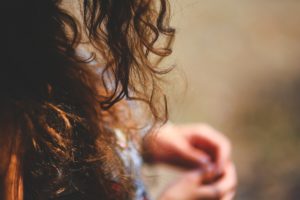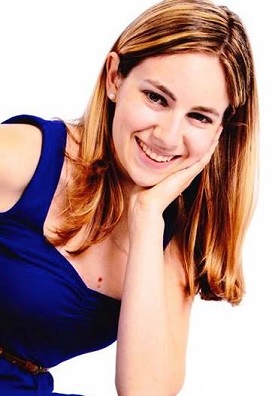- Calls to this hotline are currently being directed to Within Health or Eating Disorder Solutions
- Representatives are standing by 24/7 to help answer your questions
- All calls are confidential and HIPAA compliant
- There is no obligation or cost to call
- Eating Disorder Hope does not receive any commissions or fees dependent upon which provider you select
- Additional treatment providers are located on our directory or samhsa.gov
Charlotte Sandy’s Eating Disorder Recovery & How She Reclaimed Her Life

Eating Disorder Hope Founder Jacquelyn Ekern interviews social worker and blogger Charlotte Sandy in this 3-part series about her experience with, and recovery from, her eating disorder.
Jacquelyn: Charlotte, can you please tell us a little bit about your background and, in your opinion, what contributed to the development of your eating disorder?
Charlotte: Absolutely! There is a lot there, and I’m still unpacking a lot of it in my own therapy. In a lot of ways, I met some of the typical eating disorder personality traits such as being perfectionistic, often rigid, a high-achiever in school. In addition to that, I think there were two big things that pushed this perfect storm over the edge.
One was my environment. My family and I grew up in a pretty upper-middle-class suburb that wasn’t very forthcoming when it came to issues that people might have. I often felt very invalidated when I would feel things more strongly than other people would, and that was difficult.
The second thing is that, from a pretty young age, I experienced severe anxiety and Obsessive-Compulsive Disorder. Both of those going undiagnosed took a toll on me and my eating disorder, without me really knowing it, became a way for me to make myself feel better, or so I thought.
Jacquelyn: It definitely sounds like those perfectionist traits, the medical predisposition, and those environmental factors could have been precursors, we see those co-occurring issues a lot. What moved you to conclude that you actually had an eating disorder and want to take steps to help yourself?
Charlotte: That was a process that happened over a timespan of a year. I was officially diagnosed with an eating disorder years before I accepted that diagnosis for myself. When I was diagnosed with anorexia, I didn’t think I knew anyone who had experienced a struggle like that.
As it turns out, I had a cousin who died due to complications from anorexia and my family members, even before I was diagnosed with an eating disorder, would say things about her that were degrading and that invalidated her struggle.
She is actually a huge part of my motivation to recover because nobody should die from an eating disorder. It is a tragedy that she never got the help that she needed. I was so ashamed of my own diagnosis that I didn’t accept it for years until I was in residential treatment for the first time around the age of 18.
In treatment, I met other people with the diagnosis, and so I felt less ashamed of it and felt more like, “okay, I struggle with this.” Before that, it wasn’t even that I wouldn’t admit it to myself, I wouldn’t admit it to my friends.
Jacquelyn: That is an interesting aspect of treatment, that it lessened the stigma for you and worked to offset some of the messages you’d gotten before that this was a shameful thing. How was that experience and what did it look like for you, going into residential treatment at 18?
Charlotte: It didn’t go well. The reality is that there are a lot of people with eating disorders that relapse and it’s hard to see that relapse does not mean you are a failure. I did a lot of things “wrong.”
For example, I left treatment and, the very next day, I moved into college. It was a horrible idea, and I ended up relapsing within two days and developed a new eating disorder behavior. Even so, it was a good experience in that I did leave feeling more confident to own my diagnosis.
 It also taught me that residential treatment isn’t a scary experience. When you’re in Outpatient services, it can sometimes be used as a threat, like, “if you get worse, you’ll have to go to the hospital and they’ll make you eat all this stuff you don’t want to eat.”
It also taught me that residential treatment isn’t a scary experience. When you’re in Outpatient services, it can sometimes be used as a threat, like, “if you get worse, you’ll have to go to the hospital and they’ll make you eat all this stuff you don’t want to eat.”
It wasn’t actually scary at all. In fact, I still keep in contact with some people who I went to treatment with there.
Jacquelyn: That’s wonderful that you had some long-standing relationships come out of that. So, you went to school right away after treatment and then, as you said, had some relapse issues, what happened from there?
Charlotte: I ended up developing binge-exercise issues where, in the past, I had experienced more strictly restricting anorexia. A lot of people with eating disorders cross behaviors, so, what happened to me then wasn’t and isn’t uncommon.
I ended up relapsing pretty badly, and I was two months away from graduation from college, I was taking the GRE, I was applying to grad schools, and it was just awful. I knew I needed to go to treatment, but I thought, “if I could just hold out until school is done.” But, in holding out, things got very out of control very quickly.
I was medically withdrawn from school, which I didn’t know could happen to me but it did, and I thank God for that experience. I could be dead right now, so I am thankful to my administration for going that because I finished school and treatment thanks to my professors being really accepting.
So, I ended up in residential treatment again at the age of 21.
Eating Disorder Hope Founder Jacquelyn Ekern continues to discuss Charlotte Sandy’s Eating Disorder Recovery and how the social worker and blogger reclaimed her life in the 2nd of this 3-part series about her experience with, and recovery from, her eating disorder.
Jacquelyn: So, right before college and then right at the end of that college phase you went back?
Charlotte: Yeah, and I should have really gone to residential treatment at 13 but, in 2000, we didn’t have the knowledge of eating disorders that we do now. I remember feeling such shame at that time.
My family didn’t know what to do, and people in my community weren’t really open about their struggles, so I didn’t go treatment. I think it would have been better for me to go to treatment as a teenager but we just didn’t know.
Jacquelyn: Absolutely, I can relate to that. I’m much older than you but the same, if I had gone to treatment at 13, what a difference that would have made. When you’re 21, you enter treatment and what is different in you this time and what did you find that was pivotal for you to start moving toward recovery?
Charlotte: I didn’t feel particularly motivated to recover, even at that time. I was depressed, I was thick, and I was really miserable.
I did make the decision, at this time in treatment, to listen to the treatment professionals and the reason I did that was because I was so miserable doing things my own way.
I thought of it as, “I guess I can give this one last shot and do the things they’re telling me to do,” so, I leaned into the process instead of trying to manipulate my environment. It was very difficult. I think I forget about it sometimes, how miserable I was.
Being asked to give up your behavior suddenly feels like losing part of yourself. But, I did, and it is the best thing I have ever done.
Jacquelyn: So, you get out of treatment, and you’ve got some new skills, what have you found helpful to keep yourself recovery-oriented?
Charlotte: I would say there are two things. The most important thing is that focusing on my eating and staying physically healthy needs always to be my number one priority.
I put the physical recovery part of that very high up on my list because, when my brain isn’t functioning optimally because of lack of calories, it’s much harder to practice skills and cope with the rest of life.
Second, going to treatment that second time really opened up the floodgates to some of the actual reasons behind my eating disorder, some of the deeper, more trauma-related ones.
That was something that, once I opened that can of worms, I couldn’t really shut it without dealing with it. This is something I still deal with in therapy.
Now, I’m not perfect, but I do work on these things and try to stay as aware as possible so that I can best deal with my emotions using skills besides food, exercise, and other eating disorder symptoms.
 Jacquelyn: Sure! This aftercare approach that you have for yourself do you have a treatment team and what is that like? How long have you been working with them & what is your opinion for needing to work with a team after getting out of treatment?
Jacquelyn: Sure! This aftercare approach that you have for yourself do you have a treatment team and what is that like? How long have you been working with them & what is your opinion for needing to work with a team after getting out of treatment?
Charlotte: I went to treatment eight years ago, and a lot of my treatment friends are fully recovered now, which is great for them.
For me, since I also have OCD and anxiety, I do work with a therapist, a dietician that I see every few weeks or once a month, a psychiatrist who helps keep my medication working.
Those are the people that I regularly see and, even though I’m doing well, I still feel like it is necessary to see people because I don’t consider myself fully recovered.
Some people see their eating disorder as something of the past, but I don’t see it as a past-tense situation, I’m always trying to be vigilant.
Charlotte Sandy’s interview with Eating Disorder Hope Founder Jacquelyn Ekern wraps up in this 3rd and final installment. Eating Disorder Hope is deeply appreciative to the social worker and blogger in discussing her experience with, and recovery from, an eating disorder.
Jacquelyn: Yes, I understand that, and it’s good to hear you have these external support systems that you relied on and that have strengthened you in your recovery. Are there other things that you do such as journaling, reading books, spending time with your dog, that you use to nurture and soothe yourself?
Charlotte: I found that I really like writing, I have a blog that I enjoy writing my observations about the world in which I live.
I also find wholeness through my work. I found that, due to my own issues, I have a lot of empathy and compassion for people who struggle with more severe disabilities. So, I’m working in the field of more Medicaid-funded behavioral health, people with disorders such as Down Syndrome or schizophrenia.
That advocacy really brings me to life. I do also love spending time with my dog. My dog is exceptionally high-maintenance, she had a ton of allergies, and she has to wear a onesie right now to keep from licking herself compulsively.
The church is another thing that is very important to me. My faith has been a huge part of my healing journey, connecting with God, and I’m also a theology nerd.
Jacquelyn: So, feeding yourself spiritually and leaning into your faith has been an essential component of your recovery?
Charlotte: Yes, absolutely.
Jacquelyn: Mine, too, thank you for sharing that. We do have a few questions from people. One is how can people find your blog and follow online?
Charlotte: I blog on a site called “Where I Stand” (https://whereistandblog.wordpress.com) and am a regular blogger there as well as on “The Mighty,” (https://themighty.com/u/charlotte-sandy/) I use the name “Charlotte Sandy” for my writings.
Jacquelyn: Do you have any advice for somebody who is trying to get the courage to go into some form of treatment, whether it be seeing a nutritionist, going to a therapist, or going all the way into residential treatment? What would you say to them?
Charlotte: I would say that I really wish I had been able to do that so, first and foremost, I think it is very courageous. There are so many messages that people get about seeking treatment, that it isn’t okay or that it is shameful.
Once I really stepped into it, I realized that it was a pathway to healing, it wasn’t a black mark on me or something in which I should feel bad or wrong. So, I would say, please feel free to reach out to whomever you want, there is nothing wrong with reaching out for help.
I know that is easier said than done but there are so many resources and hotlines to which you can reach out. The first step is the hardest.
Jacquelyn: I agree, that first step is really hard. Another question is “how is body image for you now and do you have any recommendations for others that are in longer-term recovery about body image?”
 Charlotte: I’m not even going to lie, I am not cured in my own body-image struggles.
Charlotte: I’m not even going to lie, I am not cured in my own body-image struggles.
One thing that I remember from treatment was being told “you can’t eat in relation to how you feel” and that always reminds me that I eat for nourishment, not for my body image or appearance.
Some people are in recovery for a lifetime and still struggle with body image. It is hard to feel wonderful about your body all the time in our culture.
I try to combat that by ignoring my brain when it thinks in a negative way about my body and then making a conscious effort to act opposite to what it is telling me to. This helps me to eat in response to what my body is hungry for and what I need.
Jacquelyn: Very good, thank you very much for that transparency, and I think myself and many others in recovery would identify with what you are saying. Another question is, “do you feel that there are any support groups that you would recommend or websites or books that were helpful to you personally?”
Charlotte: Absolutely, I read a lot in my recovery. I am hoping to write an eating disorder memoir myself so, in preparation for that, I have read so many that are out there.
Some can be very triggering or end up being a “how-to” one author I like is Carrie Arnold, who wrote Decoding Anorexia. I also recommend looking into Celebrate Recovery groups, I have personally been to them and have a friend I was in treatment with who just wrote a book and is really involved with Celebrate Recovery.
Jacquelyn: That is awesome, for you to see her growth that way. So, Decoding Anorexia is a book you would recommend, and I absolutely agree that Celebrate Recovery is a good resource. And folks can also follow your blog to find out, I would assume, information on your friend’s book as it is released?
Charlotte: Yes, she actually has a great blog as well. It is just so powerful to have known someone at that low point eight years ago and to see them writing a book or getting married, having kids.
Eight years ago, I thought I might die, but here I am today, and here they are in such a different context, and it is incredibly inspiring.
Source:
Virtual Presentation by Charlotte Sandy in the Dec. 7, 2017 Eating Disorder Hope Inaugural Online Conference: “Virtual Hope for Eating Disorder Recovery”
 About the Author: Charlotte Sandy is a social worker, Christian, blogger, wife, and dog mom. She struggled with an eating disorder starting at age 13 but has been in recovery for years. In her professional life, she works in a managed care setting.
About the Author: Charlotte Sandy is a social worker, Christian, blogger, wife, and dog mom. She struggled with an eating disorder starting at age 13 but has been in recovery for years. In her professional life, she works in a managed care setting.
In her personal time, she enjoys her native state of Michigan, friends, family, writing, serving, church, and reading. By writing about eating disorders/ mental health and participating in eating disorder advocacy, she hopes to show others recovery and healing are possible.
 About the Transcript Editor: Margot Rittenhouse is a therapist who is passionate about providing mental health support to all in need and has worked with clients with substance abuse issues, eating disorders, domestic violence victims, and offenders, and severely mentally ill youth.
About the Transcript Editor: Margot Rittenhouse is a therapist who is passionate about providing mental health support to all in need and has worked with clients with substance abuse issues, eating disorders, domestic violence victims, and offenders, and severely mentally ill youth.
As a freelance writer for Eating Disorder and Addiction Hope and a mentor with MentorConnect, Margot is a passionate eating disorder advocate, committed to de-stigmatizing these illnesses while showing support for those struggling through mentoring, writing, and volunteering. Margot has a Master’s of Science in Clinical Mental Health Counseling from Johns Hopkins University.
The opinions and views of our guest contributors are shared to provide a broad perspective of eating disorders. These are not necessarily the views of Eating Disorder Hope, but an effort to offer a discussion of various issues by different concerned individuals.
We at Eating Disorder Hope understand that eating disorders result from a combination of environmental and genetic factors. If you or a loved one are suffering from an eating disorder, please know that there is hope for you, and seek immediate professional help.
Published on October 5, 2018.
Reviewed & Approved on October 5, 2018 by Jacquelyn Ekern MS, LPC
Published on EatingDisorderHope.com
